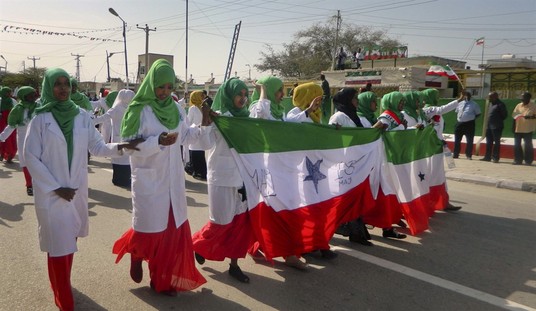Yesterday, I was pleased to be able to attend part of a conference in New York on Reclaiming American Liberty. Sponsored by The Hudson Institute, in conjunction with Family Security Matters and Human Events, the day-long conference set itself the lugubrious task of registering the many ways in which American liberty is being eroded by an intrusive government. The morning panels, which I missed, included of economic matters and national security, and included talks by Betsy McCaughey, Gen. Richard Myers, and Andrew McCarthy, among many others. The afternoon panel was devoted to national sovereignty, which is another ways of saying it was devoted to the task of self preservation. The panel, moderated by Midge Decter, featured talks by former Attorney General Michael Mukasey, Joseph Loconte, a research fellow at The King’s College in New York, my Pajamas Media colleague Claudia Rosett, and the Mark Steyn, the prolific author and columnist.
I won’t endeavor to provide a precis of the proceedings other than to note that the picture presented was a grim one. David Hume remarked that “It is seldom that liberty of any kind is lost all at once.” But as we look around the world today, the assaults on liberty are as multifarious as they are insidious. Whether one considers the resurgence of socialist sentiment in this country and in Europe, the top-down policies promulgated by increasingly centralized and increasingly unaccounted governmental agencies, or the smorgasbord of legislation designed to stymie innovation and enforce conformity on issues from energy consumption to health care, we live in an age in which freedom is regularly bartered for the that peculiar emotion of virtue that is never far away from the heart of leftist sentimentality.
Although the speakers ranged widely, touching on issues from the proper way to deal with terrorists to the depredations of that embarrassing international sink hole, the United Nations, the unifying theme was something Mark Steyn dilated on in his remarks: political correctness.
The very phrase “political correctness” has a certain period feel to it — is it not just a bunch of silliness that sweep through college campuses in the 80s and 90s but that we are now well beyond?
Hardly. At the core of political correctness is a refusal of reality, a refusal to call things by their real names, hence a the propagation of a lie.
Today, the phrase “political correctness” is generally accompanied by a smile — an uneasy smile, but a smile nonetheless. The phrase describes some exaggerated bit of left-wing moralism — so exaggerated that it is hard to take seriously. We smile when we read about an elite American college that has enrolled the sin of “lookism” — the unacceptable belief that some people are more attractive than others–into its catalogue of punishable offenses. We laugh when hearing that a British academic has condemned Frosty the Snowman as a white “male icon” that helps “to substantiate an ideology upholding a gendered spatial/social system.” We scoff when we hear about the University of Michigan professor who complains that J. K. Rowling’s Harry Potter books “conventionally repeat much of the same sexist and white patriarchal biases of classical fairy tales.” We smile, we laugh, we scoff. But we do so uneasily.
Why the uneasiness? There are several reasons. In the first place we know that such strictures, though preposterous, are not without consequence. Indeed, the phenomenon of political correctness is a great teacher of the often overlooked fact that the preposterous and the malign can cohabit happily. The odor of thuggishness is never far from the lairs of political correctness. The student accused of lookism can be severely penalized for the offense, as can the student accused of racism, “homophobia,” or “mis-directed laughter.” In some cases, the academic thought police even attempt to regulate what is not said, as when an editor of a student newspaper was removed from his post because he had given “insufficient coverage” to minority events. We laugh when we read about poor Frosty, but the laughter dies when we consider that the professor who would have us melt Frosty is also someone responsible for the education of students. It is amusingly ludicrous to burden Mrs. Rowling’s entertainments with feminist rhetoric, but then we remember that books can be banned or slighted for less.
Milan Kundera’s novel The Joke traces the fortunes and amours of a young student, Ludvik, after his exasperatingly earnest girlfriend decides to show the authorities a postcard he had written to her as a joke: “Optimism is the opium of the people! A healthy atmosphere stinks of stupidity! Long live Trotsky!” As a result of this whimsy, Ludvik finds himself expelled from the Communist Party and the university, and is eventually conscripted to work in the mines for several years. Among other things, Kundera dramatizes the dynamics of political correctness. He is especially good at portraying one of its signal features: I mean humorlessness. One of the points of The Joke is that totalitarian societies cannot abide a joke; political correctness is a kind of geiger counter that registers deviations from the norm of earnestness. Any deviation is suspect, any humourous deviation is culpable.
The allergy to humor that is integral to political correctness is one reason the art of parody has suffered in recent years. Then, too, a parodist, to be successful, must be able to count on his audience’s ability to distinguish clearly between the parody and the reality being spoofed. The triumph of political correctness has long since blurred that distinction. Whose ideological antennae are sensitive enough to register accurately the shifting claims of victimhood and entitlement? A mayoral aide in Washington. D.C. uses the word “niggardly” in conversation with a black colleague; the colleague takes offense because he thinks “niggardly” is racist; the aide promptly offers his resignation, which is accepted. True? Or parodic exaggeration? True, all too true. Or what about the Obama administration’s directive that the global war on terror was henceforth to be renamed “global contingency operations,” or former British Home Secretary Jacqui Smith’s insistence that acts of terrorism perpetrated by Islamic radicals be rebaptized “anti-Islamic activity“? You really can’t make it up.
What Kundera gave us was a fiction about–in part about — political correctness. But documentary evidence is also near at hand. One can consult Solzhenitsyn, for example, or, even nearer at hand, study the pronouncements of think tanks like the Runnymede Trust, whose 400-page report on “The Future of Multi-Ethnic Britain” a couple of years ago contained the surprising news that the word “British” has “racist connotations.” Even worse, it turned out, is the word English:
To be English, as the term is used, is to be white. Britishness is not ideal, but at least it appears acceptable when suitably qualified, such as Black British, Indian British, British Muslim and so on.
There is one insuperable barrier: Britishness, as much as Englishness, has systematic, largely unspoken, racist connotations. Whiteness nowhere features as an explicit condition of being British, but it is widely understood that Englishness is racially coded. The unstated assumption is that Britishness and whiteness go together like roast beef and Yorkshire pudding. There has been no collective working through of the imperial experience.
The absence from the national curriculum of a rewritten history of Britain as an imperial force, involving dominance in Ireland, Africa, the Caribbean and Asia, is proving to be an unmitigated disaster.
“Rewritten history”? You said it. Among the many recommendations made by “The Future of Multi-Ethnic Britain” was the demand that British history be “revised, rethought or jettisoned” in order to meet the requirements of “inclusivity.” The report makes many other recommendations–it calls, for example, for race equality and “cultural diversity” inspections in schools, and suggests that television franchise holders be required to appoint a specified number of Black and Asian staff.
On an even more ominous front we have the activities of the European Union, that bastion of political correctness, whose tax-exempt ministers are appointed, not elected, who seem to be accountable to only to themselves, who meet in secret and issue binding diktats that affect the daily lives of people all over Europe. Nice work if you can get it. A few years ago the EU made it illegal for journalists to criticize its policies. Last year, it decided that racism and xenophobia were crimes that could carry a prison sentence of two or more years. “Racism” and “xenophobia” they defined as harboring an aversion to people based on “race, colour, descent, religion or belief, national or ethnic origin.” I do not love thee, Dr. Fell, the reason why I cannot tell — but it is certainly not because of your race, nationality, skin color, religious beliefs, sexual preferences, or any physical or mental disabilities from which you may suffer.
As these examples suggest, contemporary political correctness, though it may have originated and matured in the academy, is not only an academic product. It thrives in the academy, true, as bacteria thrives in rotting flesh. But political correctness has metastasized. It now thrives outside academia wherever a certain type of intellectual congregates. In the corridors of the European Union or in anxious bureaucracies like Oxbridge, the BBC, and the United Nations. I hasten to add that by “intellectual,” I do not mean “intelligent.” I mean characterized by a certain lofty moralism — progressive, abstract, activist. Dubbing this attitude a form of “Olympianism,” the political philosopher Kenneth Minogue details its initiatives:
There is a dire purposiveness about the Olympian passion for signing up to treaties and handing power over to international bureaucrats who want to rule the world. Everything down to the details of family life and the modes of education are governed and guided so as to fit into the rising project of a world government. The independence of universities in choosing who to admit, of firms choosing whom to employ, of citizens to say and think what they like has all been subject to regulation in the name of harmony between nations and peace between religions. The playfulness and creativity of Western societies is under threat. So too is their identity and freedom.
The Hudson Institute, Family Security matters, and Human Events are to be heartily congratulated (and earnestly supported: click on their web sites, linked above, and contribute!) for taking the initiative and bringing these issues to the public’s attention. This conference was billed as the first annual conference on reclaiming American liberty. It would be a melancholy task to speculate on how much more liberty we might lose by the time the second annual conference convenes — assuming, of course, that any such heterodox enterprise were still allowed to go forward.









Join the conversation as a VIP Member